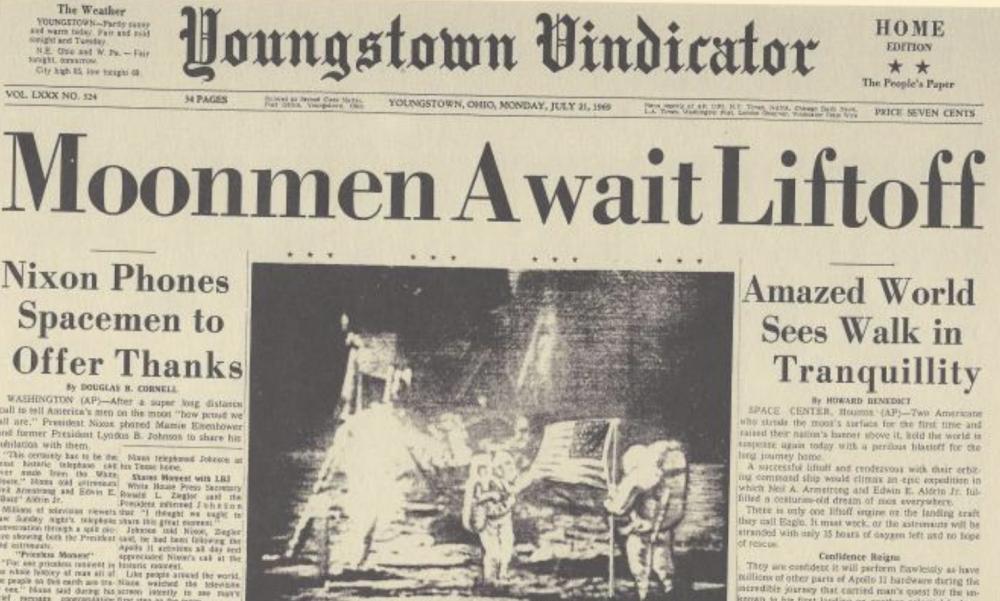Death of a loved one is devastating.
Death of a friend is wrenching.
Death of a relationship founded on familiarity and need tears at your sense of place.
So, Youngstown, Ohio will lose its daily newspaper, the Vindicator, on Aug. 31 after 150 years in print. The community will lose its pipeline to news and information—a vital part of its socioeconomic infrastructure and its longtime identity.
While 1,800 newspapers have closed their doors during the past 16 years, disappearance of the Vindicator will deprive a good-sized city of 65,000 residents and a metro area of more than 500,000 with no daily newspaper. In many cases, evening papers have ceased to exist while morning newspapers continued to publish.
Last week I wrote about municipal sinkholes. Demise of a local newspaper creates an emotional hole that can hardly be filled, even by word of mouth or the internet.
Healthy communication ceases. Replacement by another tactile newspaper is unlikely due to cost and economic conditions; advertising dollars have flowed to online media outlets.
A blue-collar city already bereft of a large General Motors plant that once employed 14,000, Youngstown now will lack a community asset that provided an inextricable link to democracy. I realize that sounds like a high-sounding reaction to diminution of free press and local news.
What it means to me, as an avid reader of three newspapers that give me invaluable perspective of national, state and local news, is that democracy is nourished and sustained by public engagement. Without information and opinion about current events, including news about government, business, culture, sports, community events, obituaries, education and health, we all suffer from detachment and, possibly, complacency.
Concerning the Vindicator, Joel Kaplan, associate dean of Syracuse University’s Newhouse School of Public Communications, said that “’no one in the community will be covering, on a regular basis, school board meetings, city council meetings, the cops and the courts.
“’Democracy, as we know it, is about to die in Youngstown.’”
A scenario that precludes oversight and accountability of government provided by pesky reporters and editors seems insufferable to me.
A scenario that blocks public engagement and prompts inadequate responsiveness to the needs of a community seems nightmarish to me.
It’s not because I’m a news junkie. It’s because I love living in a democracy defined by constant, often noisy dialogue, controversy and difference of opinion. Letters to the editor, for example, are a highlight of any paper. What an ideal platform for engagement (here I go again) and unvarnished (though edited) viewpoints.
As noted, a newspaper, when it functions optimally, provides a conduit to the community in which we live, work, play and pray. It’s invaluable, a beacon of light, a telltale sign that a community is healthy.
Mind you, I realize that Mid-Shore newspapers tend to shy away from hard-hitting news, the type that elected officials and high-ranking government appointees fear. The tension between our democratic institutions and the free press is necessary, if not off-putting to those under the journalistic microscope.
I’ve been on both sides of the divide. I was a small-town newspaper editor determined to be vigilant and professional. I never sought a Pulitzer Prize. I would have been delusional had I had been so ambitious.
Then, I switched roles as public affairs officer for the Maryland National Guard. My professional life was uncomfortable at times; the spotlight sometimes stung. As the designated spokesperson, I anticipated with dread the automatic inquiries that materialize after a training accident or emergency.
Yet, I loved the give-and-take. And, believe it or not, I inwardly commended the media interest.
I strove to provide more sunshine than spin. I likely did both
I grieve the loss of another newspaper in a nation that’s becoming increasingly underserved by the legacy print publications. Communities are diminished by the dearth of local news.
A former reporter for the Vindicator who grew up reading the paper with her grandmother, Kalea Hall, said,” ‘It was the paper that first taught me the importance of journalism. It was always scrappy and going after corrupt officials (in Mahoning Valley). I was in awe of that.
“’I can’t explain how difficult it is to see this happen, but I understand given the conditions of the newspaper industry. I beg people to support local journalism. It’s essential to democracy.’”
Death of a longtime newspaper is mournful, stifling a cherished sense of place for residents hungry for communication.
Columnist Howard Freedlander retired in 2011 as Deputy State Treasurer of the State of Maryland. Previously, he was the executive officer of the Maryland National Guard. He also served as community editor for Chesapeake Publishing, lastly at the Queen Anne’s Record-Observer. In retirement, Howard serves on the boards of several non-profits on the Eastern Shore, Annapolis and Philadelphia.
Howard will be off for the next few weeks and will return in late August.



Write a Letter to the Editor on this Article
We encourage readers to offer their point of view on this article by submitting the following form. Editing is sometimes necessary and is done at the discretion of the editorial staff.